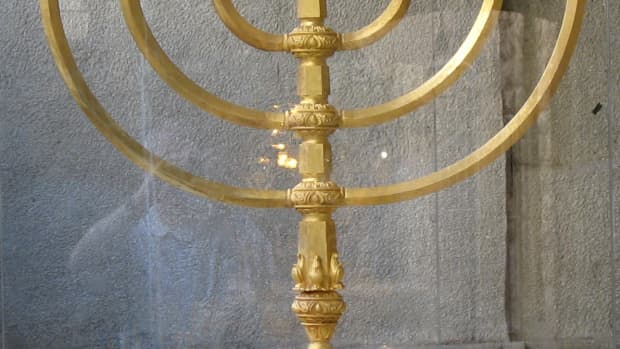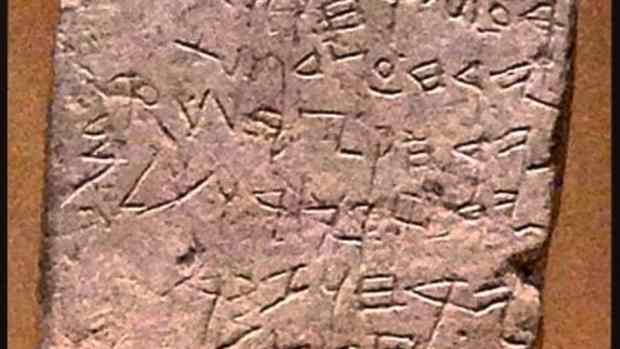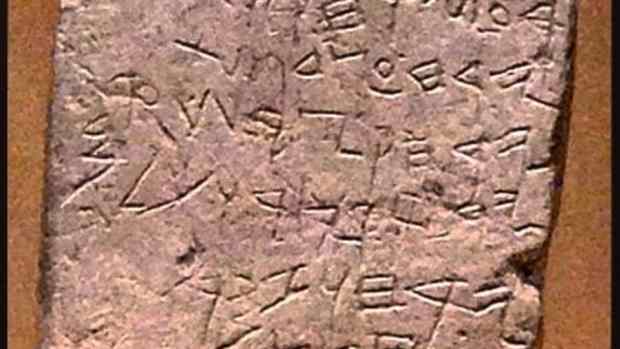God's Ten Words at Sinai and the Ten Things God Said at Creation—One Through Three
The Ten Words
This article will study the first three of the "Ten Words" from Exodus chapter 20, otherwise more commonly known as the Ten Commandments, and connect them with the ten things God says in the creation account.
The more literal rendering of the "Ten Commandments" as "Ten Words" does not imply that these ten things God spoke are simply suggestions. Instead, it adds concreteness to the understanding that what God says is of supreme significance and every created thing, but humankind obeys His Word. When God speaks, everything is supposed to listen.
"He spoke, and it was done; He commanded, and it stood fast."
— Psalm 33:9
The Number Ten
God, speaking, creating, and the idea of obedience are connected here and in the flood narrative. God speaks ten times in Genesis chapters 6-9 in a sort of de-creation for the purpose of reconstruction in the account. Twice, it is mentioned that Noah obeyed God's commands, and twice, it is noted that the animals obeyed God's commandments.
Moreover, in the book of Exodus, there are ten plagues as commanded by God, marked by three "as the Lord commanded" statements in the context of His word obeyed. These connections, too, are linked with creation. The first chapter of Genesis includes elements such as humankind, animals, creeping things, flying things, fish, water, and darkness.
Proverbs chapters 1-9 include ten speeches of a father to his son concerning obedience to God's ways. The command to obey and "keep commands" is noted ten times within the entire book of Proverbs.
He also taught me, and said to me:
“Let your heart retain my words;
Keep my commands, and live.— Proverbs 4:4
First of the Ten Words
We will use the Jewish numbering of the commands for this study.
The first of the "Ten Words" begins with the following.
“I am the Lord your God, who brought you out of the land of Egypt, out of the house of bondage"
— Exodus 20:2
It is relevant for God to start by acknowledging who He is and who we are in our relationship with Him. The LORD being "your God" is the first order of business, relationally speaking. Jesus confirms this thought with the following application.
.... No one comes to the Father except through Me.
— John 14:6
The Father's ultimate sacrifice brought us out of the house of sin's bondage. A prerequisite of this relationship is understanding that this was at a high cost to God.
" ... He gave His only begotten Son ... "
— John 3:16
The sacrifice of God's perfect Son was a necessary element of deliverance that parted the chaotic waters of sin and death so that we might reunite with Him.
For you were bought at a price; therefore glorify God in your body and in your spirit, which are God’s.
— I Corinthians 6:20
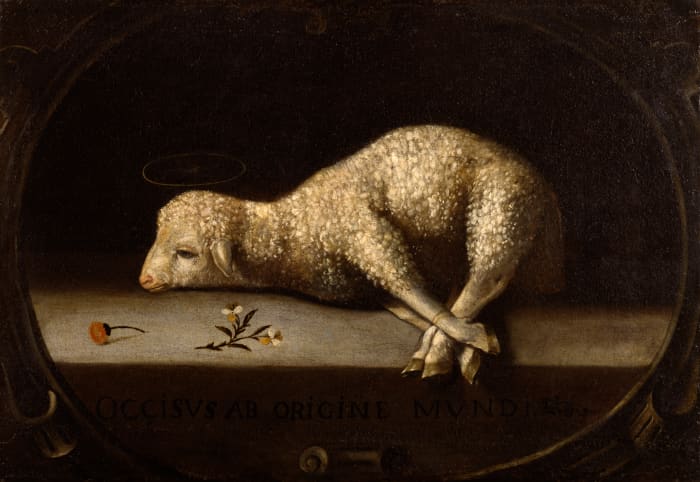
This symbolism of Christ as a sacrificial lamb who brings salvation derives from the feast of Passover, instituted after the Lord saved the Jews in Egypt who brushed the blood of slaughtered lambs over their doors between circa 1670 and circa 1684
Josefa de Ayala http://Walters Art Museum
It's About Surrender
Through the sacrificial covenant death of God's Only Son, we have been brought and bought out of the land of Egypt (the world) and the house of bondage (sin).
It isn't easy to understand and admit that we are ruled by anything other than ourselves. In John chapter eight, Jesus is speaking with some Jews, whom the text says believed in Him, and the religious folk who didn't, and He states the following to those who believe.
“If you abide in My word, you are My disciples indeed. And you shall know the truth, and the truth shall make you free.”
— John 8:31-32
The reply of the unbelieving religious folk illustrates the free agent delusion.
“We are Abraham’s descendants, and have never been in bondage to anyone. How can You say, ‘You will be made free’?”
— John 8:33
Surprisingly, these very same people claiming freedom based upon being descendants of Abraham lived in bondage for about 400 years to the Egyptians and were subject to the oppressive Roman regime at the time of their speaking. This denial and forgetfulness are reminiscent of how we often forget the bondage we came from or won't acknowledge we were ever in bondage to anything at all.
Jesus explains
"whoever commits sin is a slave of sin."
— John 8:3
The very first order of business is to know God through His Son and understand what great salvation He has done for us.
" ... how shall we escape if we neglect so great a salvation . . ."
— Hebrews 2:3
Submission to God is fundamental. Acknowledgment and obedience to this first truth are essential to a relationship with God and obeying any other "Words" that follow.
"We can never rightly understand God's grace until we understand our plight as those who need His grace"
— Jerry Bridges
"Christ is never fully valued until sin is clearly seen."
— J.C. Ryle
The First "And God Said"
Interestingly, the first utterance of God in Genesis chapter one corresponds with the first of the "Ten Words."
“Let there be light.”
— Genesis 1:3
This first action confirms that the first order of business is revelation represented by the light. Apart from Christ, we are without form and void. Our state of being without Him is one of bondage to chaos and deep darkness. This view makes sense for Jesus's claim of being the "Light of the world" (Jn 8:12). He is Jesus Christ, our savior who makes order, function, and purpose out of chaos.
The Second of the Ten Words
The second "Word" or command from Deuteronomy 20 is the following.
“You shall have no other gods before Me."
This command also includes not making any images to worship and expresses God's jealousy. Fidelity is expected and cherished in marriage, so it is with God.
In the above verse, the literal translation of "before me" is "upon my face," or we might say "in my face." Having other lovers is an "in God's face" activity.
... no creature is hidden from his sight, but all are naked and exposed to the eyes of him to whom we must give account.
— Hebrews 4:13
The Hebrew word "achar," most commonly translated as "other" in this verse, can be viewed from another aspect found in a related definition of this word. It is defined as "behind" or in the "background" in Gesenius Lexicon. We might think that God can't see what we are hiding behind our backs or what's running in the background of our hearts and minds.
“Son of man, have you seen what the elders of the house of Israel do in the dark, every man in the room of his idols? For they say, ‘The Lord does not see us, the Lord has forsaken the land."
— Ezekiel 8:1
He rightly explains in this second word that what we hide behind our backs is really in His face. He sees what is running in the background.
It is very uncommon in the Western world to build an inanimate object to worship. However, let's look carefully in our hearts. We might glimpse some carefully carved structures we have built to suit our desires and needs that can only be satisfied in and through a living relationship with the only living and eternal God.
The Second "And God Said"
Let there be a firmament in the midst of the waters, and let it divide the waters from the waters Thus God made the firmament, and divided the waters which were under the firmament from the waters which were above the firmament.
— Genesis 1:6,7
The concept in this account is about separating and distinguishing between what is above and what is below, what is earthly and fleshly, and what is heavenly and spiritual. This word usage is interesting in that, in the second of the "Ten Words," God talks about not making carved images to worship that include things both above and below.
You shall not make for yourself a carved image—any likeness of anything that is in heaven above, or that is in the earth beneath, or that is in the water under the earth.
— Exodus 20:4
Recommended
He uses the same concepts above and below in the above verse. Conceptually, we are to distinguish Him above all that is above or beneath, physical or spiritual. Nothing compares to Him; He is the true Holy one set apart and distinguished from all else.
God also distinguishes between two things in this portion of Scripture: those who hate Him and those who love Him.
I, the Lord your God, am a jealous God, visiting the iniquity of the fathers upon the children to the third and fourth generations of those who hate Me, but showing mercy to thousands, to those who love Me and keep My commandments.
— Exodus 20:5-6
It's About Separation
We see the concept of waters separating and dividing throughout Scripture. Relatedly, there was a flood that separated light and dark in humanity. The Sea split for Moses and the people, separating the people from Egypt. We see it in Joshua, where Jordan's waters are separated so God's people can be separated from their wilderness, wandering to a promised land. Both Elijah and Elisha separated waters with Elijah's mantle.
This concept of separating is consistent with the idea of holiness. Holiness is a word that expresses the idea of separating oneself unto the Lord and removing oneself from competing attachments.
And if it seem evil unto you to serve the Lord, choose you this day whom ye will serve; whether the gods which your fathers served that were on the other side of the flood, or the gods of the Amorites, in whose land ye dwell: but as for me and my house, we will serve the Lord.
— Joshua 24:15
I call heaven and earth as witnesses today against you, that I have set before you life and death, blessing and cursing; therefore choose life, that both you and your descendants may live.
— Deuteronomy 30:19
Loyalty to God could sum this one up. We begin by acknowledging who God is and His great salvation, and secondly, we separate ourselves apart, distinguishing Him above all else in faithfulness to Him and worship Him alone.
The Third of the "Ten Words"
"You shall not take the name of the Lord your God in vain ... "
— Exodus 20:7a
The focus in Christianity concerning the above verse has predominantly been on the verbal aspect of using God's name to cuss, curse, or swear.
Although this command includes not using His name flippantly or disrespectfully, I feel we have neglected the command's weightier intent, which has more to do with how we live than what we say.
The "Pirkei Avos," a Jewish commentary on Torah teachings, interprets this command similarly.
"Desecration of the name involves the sort of conduct that makes onlookers think or say that people who claim to be observant Jews act in an unworthy manner. "
— Ben Zoma
The Hebrew translation of the word "take" in this verse uses the Hebrew word "naw-saw," which is defined as "to bear," "lift up," "carry," or "to wear."
We can see that bearing His name and wearing His name means much more than merely the act of speech.
The book of Proverbs confirms that lying and stealing are considered a violation of this command.
Remove falsehood and lies far from me;
Give me neither poverty nor riches—
Feed me with the food allotted to me;
Lest I be full and deny You,
And say, “Who is the Lord?”
Or lest I be poor and steal,
And profane the name of my God— Proverbs 30:8-10
The above verse shows us how living as if there is no God is taking His name in vain and distorting His image to those around us.
The Hebrew word translated as "vain" is defined as worthless, false, and deceitful and can include the idea of ruining and destroying.
According to these definitions, a paraphrased version of this verse might read something like the following.
"You shall not bear or wear the name of YHVH (the Lord who gave up Himself to covenant with you and give you life physically and spiritually) Your God, in an empty way that is false and that would deceive others about who He really is by the way you represent Him in speech and in action."
In Ezekiel chapter 43, God scolds His children who had been taken captive to Babylon for giving Him a bad name in the eyes of the world around them. They did this by combining their worship of Him with the worship of the other gods. The Word reads that they defiled His Holy name by how they lived.
“Son of man, this is the place of My throne and the place of the soles of My feet, where I will dwell in the midst of the children of Israel forever. No more shall the house of Israel defile My holy name, they nor their kings, by their harlotry or with the carcasses of their kings on their high places. When they set their threshold by My threshold, and their doorpost by My doorpost, with a wall between them and Me, they defiled My holy name by the abominations which they committed.
— Ezekiel 43:6-8
Jeremiah gives us another example in chapter 34 of his book. In the chapter's setting, God commanded the children of Israel to release their fellow men and women from serving them as slaves. He appeals to them from the perspective of God Himself, freeing them from bondage in Egypt, and communicates His expectation that they uphold His reputation and name by behaving likewise. Initially, they obeyed but then changed their minds and took back their slaves, and this is God's confrontation with them.
... you turned around and profaned My name, and every one of you brought back his male and female slaves, whom you had set at liberty, at their pleasure, and brought them back into subjection, to be your male and female slaves.
— Jeremiah 34:16
The profaning of God's name occurs when we act inconsistently with God's character and wishes. Our actions are to reflect the God we serve.
"It is not that God arbitrarily commanded His people to have a care in the speaking of His name as if He were jealous of its irreverent mention, but it is that He reminded them that the coming into the privileges of His name was the coming into the responsibilities of that name ... so God said to His people: "Thou shalt not take"—shalt not assume, bear, carry - "the name of the Lord thy God in vain"—insincerely, vainly, "for the Lord will not"—cannot—"hold him guiltless that taketh"—claimeth the privileges of—"his name in vain"—vainly, insincerely . . . His name is on us, and His honor is in our keeping. Wherefore, "let every one that nameth the name of the Lord"—claimeth it as his own name—"depart from unrighteousness;" and let him never feel that it is a light or a vain thing to bear that name before the world
— H. Clay Trumble "The Ten Commandments As A Covenant Of Love"
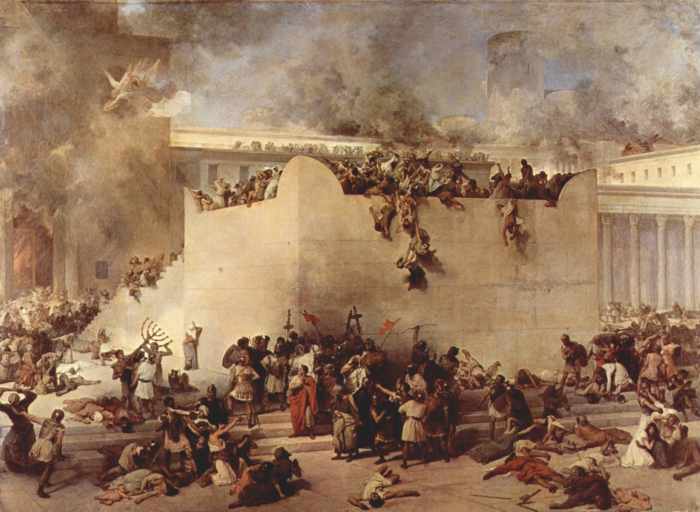
Jerusalem the place where God chose for His name to dwell and be represented was destroyed in 70 a.d. by the Romans as Jesus foretold to those who wore His name in vain as he pleaded in prayer for them to be gathered under His wings
Francesco Hayez (1791–1882) http://The Yorck Project: 10.000 Meisterwerke der Malerei. DVD-ROM, 2002. ISBN 3936122202. Distributed by DIRECTMEDIA Publ
It's About What We Do
We are not to bear and wear God's name in a way that ruins or destroys His reputation in the eyes of a watching world.
Let your light so shine before men, that they may see your good works and glorify your Father in heaven.
— Matthew 5:16
Bearing His name is an ambassadorship. We represent the God we serve by the way we live. He is commanding us not to give Him a bad reputation in the eyes of others and not represent Him falsely.
" ... we are ambassadors for Christ ... "
— II Corinthians 5:20
The phrase in this command explains this further and firms up the intent of meaning having more to do with lifestyle.
"... for the Lord will not hold him guiltless who takes (bears) His name in vain."
— Exodus 20:7b
This revelation exposes the lie we often believe that we can live however we want and still bear His name without consequence.
"You cannot drink the cup of the Lord and the cup of demons; you cannot partake of the Lord’s table and of the table of demons. Or do we provoke the Lord to jealousy?"
— I Corinthians 10:21-22
The Third "And God Said"
The third thing God said in the creation account concerning this Word was
“Let the waters under the heavens be gathered together into one place, and let the dry land appear.”
— Genesis 1:9
We see a picture of the land exalted, illustrating this idea.
... since the creation of the world His invisible attributes are clearly seen, being understood by the things that are made.
— Romans 1:20
Our responsibility is to lift up His name and not tear it down.
. . . let us exalt (make high and present) His name together.
— Psalm 34:3
"Let the waters be gathered" ... waters in Scripture can sometimes symbolize masses of people or gathered people as we see imaged in Revelation chapter 7.
. . . a great multitude which no one could number, of all nations, tribes, peoples, and tongues, standing before the throne and before the Lamb, clothed with white robes, with palm branches in their hands,and crying out with a loud voice, saying, “Salvation belongs to our God who sits on the throne, and to the Lamb!” All the angels stood around the throne and the elders and the four living creatures, and fell on their faces before the throne and worshiped God, saying:
“Amen! Blessing and glory and wisdom, Thanksgiving and honor and power and might, Be to our God forever and ever. Amen.”
— Revelation 7:9-14
This next verse, along with the previous one, communicates the idea of making His name great among and to all the earth's gathered people.
Let them exalt (make high and present) Him also in the assembly of the people, And praise Him in the company of the elders.
— Psalm 107:32
A concluding observation is that the number "three" in the Bible is the number of the Spirit. H. Clay Trumble makes this note concerning the first three commandments connecting this theme.
"The first three of the ten requirements of the loving covenant of God's people with their God are simply the requirements to worship God as the only God, to worship Him in unhindered spirituality, and to worship Him in all sincerity. These fundamental requirements seem to have been in the mind of our Lord Jesus when He said to the woman of Samaria at the well of Jacob: "God" - the One God - "is a Spirit: and they that worship Him must worship in spirit and in truth."
— H.Clay Trumble
© 2013 Tamarajo













